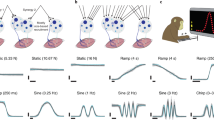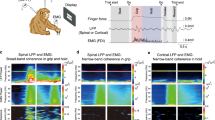Abstract
MOST mammalian muscles include muscle fibres of different histochemical types which are organised in separate motor units (a motor unit is a group of muscle fibres innervated by a single motoneurone) with different physiological characteristics1. When a muscle carries out a slowly graded contraction, the motor units of the slow type are activated before the motor units with a faster contraction time which are also the ones developing more force since they include a larger number of muscle fibres2. This orderly recruitment can also be shown in intact man in whom the spike-triggered averaging method further allows the extraction of the mechanical twitch of a single motor unit from the whole muscle force3. In view of the versatility of the human hand movements and considering recent inferential views about variations in the recruitment order of motor units4,5, we had anticipated that the fast motor units could be preferentially recruited in brick voluntary contractions. This expectation is not borne out by the results presented. On the contrary we found the faster motor units to be recruited after the slow motor units, even in fast contractions.
This is a preview of subscription content, access via your institution
Access options
Subscribe to this journal
Receive 51 print issues and online access
$199.00 per year
only $3.90 per issue
Buy this article
- Purchase on Springer Link
- Instant access to full article PDF
Prices may be subject to local taxes which are calculated during checkout
Similar content being viewed by others
References
Kugelberg, E. & Edstrom, L. J. Neurol. Neurosurg. Psychiat. 31, 415–423 (1968).
Henneman, E., Somjen, G. & Carpenter, D. O. J. Neurophysiol. 28, 560–580 (1965).
Milner-Brown, H. S., Stein, R. B. & Yemm, R. J. Physiol., Lond. 228, 285–306 (1973).
Basmajian, J. V. Science 141, 440–441 (1963).
Grimby, L. & Hannerz, J. J. Neurol. Neurosurg. Psychiat. 31, 565–573 (1968).
Tanji, J. & Kato, M. Expl Neurol. 40, 771–783 (1973).
Desmedt, J. E. & Godaux, E. J. Physiol. Lond. 264, 673–694 (1977).
Milner-Brown, H. S., Stein, R. B. & Yemm, R. J. Physiol., Lond. 230, 359–370 (1973).
Kuypers, H. G. J. M. in New Developments in Electromyography and Clinical Neurophysiology 3 (ed. Desmedt, J. E.) 38–68 (Karger, Basel, 1973).
Phillips, C. G. Proc. R. Soc. B 173, 141–174 (1968).
Vallbo, A. B. J. Physiol., Lond. 218, 405–431 (1971).
Henneman, E. in The Neurosciences, 3rd Study Program (eds Schmitt F. O. & Worden, F. G.) 281–291 (MIT Press, Cambridge and London, 1974).
Kornhuber, H. H. Kybernetik 8, 157–162 (1971).
Johnson, M. A., Polgar, J., Weightman, D. & Appleton, D. J. neurol. Sci. 18, 111–129 (1973).
Salmons, S. & Streter, F. A. Nature, 263, 30–34 (1976).
Author information
Authors and Affiliations
Rights and permissions
About this article
Cite this article
DESMEDT, J., GODAUX, E. Fast motor units are not preferentially activated in rapid voluntary contractions in man. Nature 267, 717–719 (1977). https://doi.org/10.1038/267717a0
Received:
Accepted:
Published:
Issue Date:
DOI: https://doi.org/10.1038/267717a0
This article is cited by
-
The effect of small changes in rate of force development on muscle fascicle velocity and motor unit discharge behaviour
European Journal of Applied Physiology (2022)
-
Recruitment gain of spinal motor neuron pools in cat and human
Experimental Brain Research (2019)
-
Surround inhibition can instantly be modulated by changing the attentional focus
Scientific Reports (2018)
-
Recruitment order of motoneurons during functional tasks
Experimental Brain Research (1994)
Comments
By submitting a comment you agree to abide by our Terms and Community Guidelines. If you find something abusive or that does not comply with our terms or guidelines please flag it as inappropriate.



